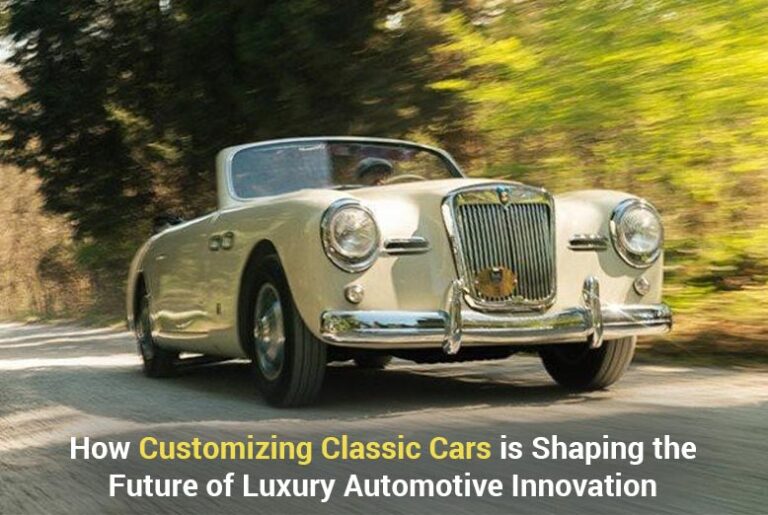The rumble of a vintage engine meeting modern automobile parts tells a story of past and future coming together. Classic car customization is no longer just a hobby for gearheads—it’s now a major force pushing luxury car makers to rethink what’s possible. This blend of old-school style with new-school tech is creating waves that reach far beyond custom shops and car shows.
Old Meets New: The Revival of Classic Design
Car lovers have always had a soft spot for the sweeping lines and bold shapes of vintage automobiles. Today’s customizers aren’t just restoring these beauties—they’re reimagining them with modern hearts.
People want the look that makes heads turn, but with the reliability that gets them home. When customers bring in a classic ford bronco for updates, they’re looking for that perfect mix of nostalgia and usability.
This trend isn’t lost on big car makers. Many luxury brands now draw heavy inspiration from their past glory days. Look at the latest Porsche 911 or Ford Mustang—their shapes honor their roots while integrating modern features on vintage designs. Even in the SUV segment, models inspired by the best vintage SUV designs are making a strong comeback, blending retro aesthetics with cutting-edge technology.
Tech Integration Without Losing Soul
Custom shops are solving a puzzle that major car manufacturers watch closely: how to add modern tech without killing the classic vibe.
The best customizers add:
- Digital gauges that look like old analog dials
- Hidden touch screens that appear only when needed
- Modern audio systems tucked behind vintage-looking controls
- Air-conditioners that don’t need ugly modern vents
These smart solutions preserve the car’s soul while adding comfort and safety. This modern take on classic design has become a compelling car proposition, attracting enthusiasts who crave both nostalgia and innovation. Luxury brands are taking notes, with many now offering ‘heritage’ editions that blend old styling with new tech in similar ways.
Custom Shops as Innovation Labs
Large car makers typically take years to move from idea to production. Custom shops can try bold ideas overnight.
They’re like the test kitchen for the auto industry. Customizers can try crazy ideas because they’re only building one car at a time. Giving car owners the opportunity to customize the cars of their dreams.
This testing ground effect is particularly strong in:
Materials innovation: Custom shops experiment with new metals, carbon fiber applications, and sustainable materials before they hit mass production.
Electric conversions: Classic car EV swaps are teaching valuable lessons about battery placement, weight distribution, and cooling in vehicles never designed for electric power.
Interior concepts: Custom design shops create one-off interiors that inspire production car designers to think beyond standard options.
Sustainability Through Restoration
Perhaps the most surprising influence of classic car customization is in sustainability. By extending the life of old vehicles through updates rather than replacement, customizers promote a different kind of green thinking.
The most eco-friendly car might be the one that already exists; updating an old car can use fewer resources than building a new one from scratch.
This philosophy is spreading to luxury brands that now emphasize longevity, repairability, and timeless design—qualities that unreliable classic car enthusiasts have valued for decades.
The New Luxury: Personal Connection
Mass production has always struggled to create emotional bonds with owners. Classic car customization offers something different: deep personal connection through involvement in the build process.
Luxury brands are now copying this playbook, offering buyers increasing levels of customization:
- Bespoke color matching services
- Personalized interior materials
- Custom engraving and embroidery
- Build experience programs where buyers participate in assembly
These offerings build stronger emotional ties to the brand and justify premium prices—exactly what custom shops have done for years.
What’s Next: The Future of Custom-Inspired Luxury
The relationship between customizers and car makers continues to evolve. We’re likely to see more:
Factory custom programs: Manufacturer-backed programs that offer custom-shop quality with factory warranties.
Limited series production: Small batches of highly customized models that test ideas before wider release.
Collaboration projects: Partnerships between famous custom builders and luxury brands to create special editions.
Modular design: Cars built with easier customization in mind from the start.
The influence of classic car customization on luxury automotive innovation shows no signs of slowing. As long as there are people who love the style of yesterday but want the performance of tomorrow, this creative tension will continue to push the entire industry forward.
In a world increasingly filled with similar-looking vehicles, the lessons from classic car customizers offer something vital: cars with personality, history, and soul—qualities that never go out of style.



